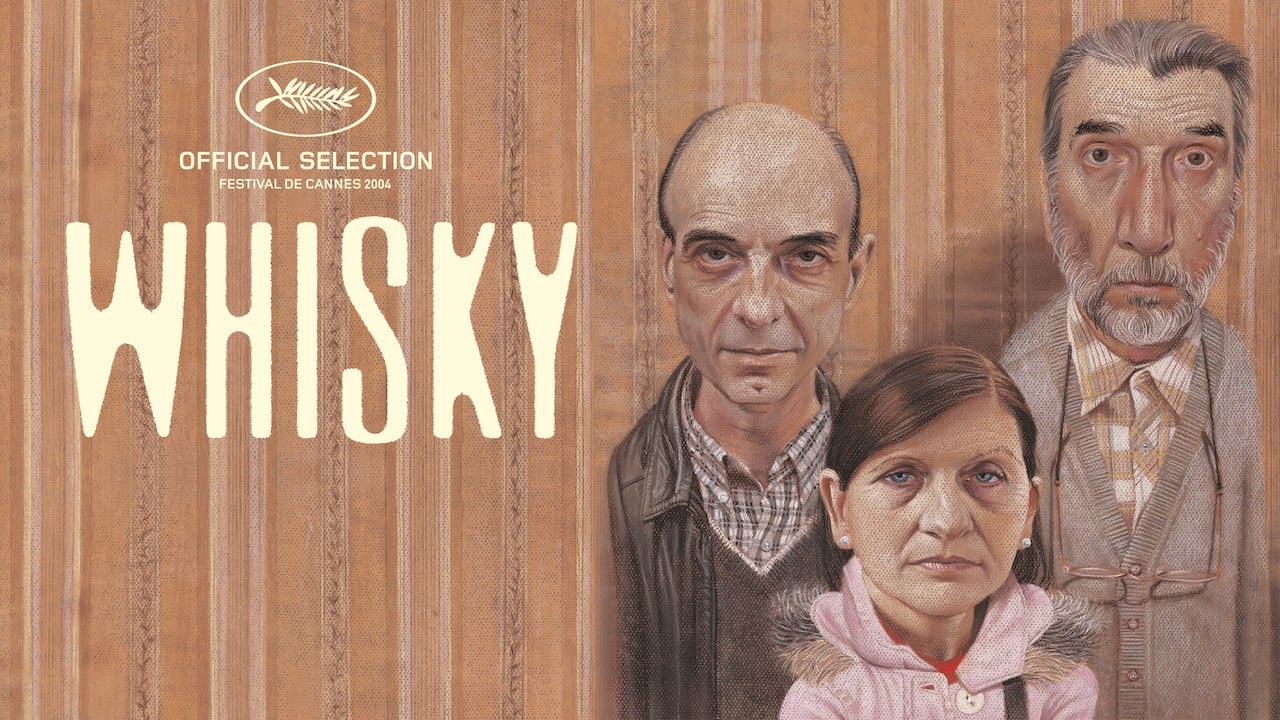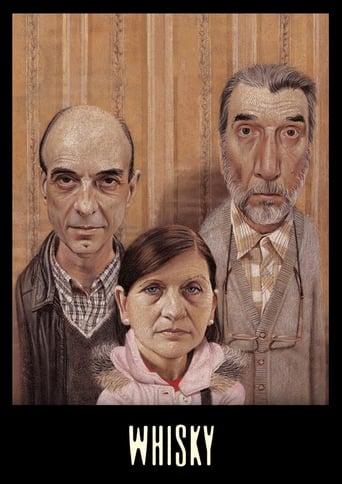Steineded
How sad is this?
TaryBiggBall
It was OK. I don't see why everyone loves it so much. It wasn't very smart or deep or well-directed.
Keira Brennan
The movie is made so realistic it has a lot of that WoW feeling at the right moments and never tooo over the top. the suspense is done so well and the emotion is felt. Very well put together with the music and all.
Tayyab Torres
Strong acting helps the film overcome an uncertain premise and create characters that hold our attention absolutely.
TxMike
DVD, approx. 90 minutes, from my public library. Spanish with English subtitles.Set in Uruguay, Jewish Jacobo, a humorless and dour man, owns a sock factory with two young women and one middle aged woman, Marta, as workers. Jacobo takes orders, Marta bags them up, and he delivers them in his car that always has trouble starting the first couple of times. Every evening, Jacobo or Marta checks the bags of the two young ladies to make sure no socks are going home with them.Jacobo's mother had been unhealthy for a while and when she died, her other son, Herman, was not able to attend the funeral. Presently they will have a memorial service for her, Herman is flying in from Brazil, and Jacobo asks Marta if she will come stay at his house for a few days, pretending she is his wife. We are never told why, I assume it was to impress his brother.We quickly see that Marta looks forward to the invitation, puts on makeup, dresses nicely, she sees an opportunity to try to turn old sow's ear Jacobo into her personal silk purse. Decent men are hard to come by, apparently.A good movie to see for anyone who enjoys different types of small, independent films. Also interesing to see oher cultures.SPOILER. After mom's memorial service, the three of them go on a mini vacation, Marta and Herman have a good time, but Jacobo worries all the time about how much things cost and is always sour. On a whim he bets money, wins, gives Marta a big "gift" of thanks. Back a work, 7:30AM, Jacobo shows up but Marta does not. We suspect she has gone for good. The title "Whisky" is in reference to what they say to smile right before photos are taken on two different occasions. Similar to our saying "cheese."
Roberto
I recently saw this masterpiece of Latin American cinema. I've always taught that you don't need a big budget to make a big movie. Great movies relay on a great message, a solid statement. On this particular case "Whisky" from the beginning makes a point through its own images and pace. The viewer gets immersed in a routine, a horrible way of life of the main character (Jacobo Koller) that consists of living with no ambition, owning a horrible sock factory and going home with nothing... not a smile, not a desire, nothing, just the same routine over and over again. At the beginning when we see the same shots over and over, it seems like the movie is insisting upon itself, but is too important to state the point of the routine. We, as viewers get tired of watching this terrible life, imagine what it would be to live this life. When the main characters brother (Herman Koller) comes to Uruguay (a far more successful,and younger brother, that lives in Brazil), Jacobo asks Marta (an employee of his) to pretend she's his wife, probably to avoid criticism from his brother and to bare his brother's trip to Uruguay with someone else. Marta has the same features as Jacobo she lives a life of routine, with no surprises, nothing to take her out of her boredom. She's shy, and retrieved within herself, there will be a couple of scenes when we can see that probably Marta has been like this since she was a girl. Her relationship with Herman grows, she's in movement she wants something new. As for Jacobo he doesn't feel anything for life he's pessimistic, stubborn, a man with no dreams. The movie invites us to review our own life, are we going in a direction of routine and boredom? or are we looking for something new? Sometimes we can find that breath of life in the smallest of places, in the most unconventional of places, a book, a movie, a song, a trip, a person anything can give us something to live. Marta surely received that breath, and we all can.
nerednos-1
Yes zeidinho, you're right, it is an extremely slow movie and no, you're wrong, because it is a beauty as well. Every time you expect something to happen (which is not so often) it does not. And when you do not it does, but so casually and so not emphasized that you could very well miss it. In this respect the film is very surprising because, in contrast with its contents, the film itself does not follow the familiar patterns of storytelling. The acting is very small and very effective. The repetitive patterns (does your life change dramatically, every day?) are as painful as they are familiar. The language of images is very smart, no need to explain much. I laughed sometimes, I moaned more often and I liked it very much.
roland-104
Droll, understated comedy that also works as an allegorical account of the general state of affairs in Uruguay these days. Jacobo Köller (Andres Pazos) runs a small, down at the heels sock factory in Montevideo. He's an avoidant, depressive, aging bachelor who had taken care of his ailing mother for years until her recent death.Now it is time for her Matzeivah (a ceremony at which a tombstone is placed on her grave), and Jacobo is obliged to invite his younger brother Herman (Jorge Bolani), who moved north years earlier to Brazil, where he has a wife and family and runs a highly successful sock factory.For reasons never made clear, Jacobo feels he must pretend to be recently married. He imposes on the long suffering Marta (Mirella Pascual), who is his forewoman at the sock factory, to act the role of his spouse.Set against the mind-numbing routines of Jacobo and Marta's dull lives, Herman arrives like a Spring breeze. He's energetic, upbeat, full of corny jokes, even vaguely seductive toward Marta. At his insistence, the trio venture on hour east for a couple of days to the seaside resort of Piriapolis, on the so-called Uruguayan Riviera.Like the run down neighborhood, household and factory inhabited by Jacobo, Piriapolis has also seen better days. The threesome represent about half the audience at a pathetic nightclub where the lead singer is a 12 year old. The only other guests at the hotel seem to be a hick couple of honeymooners from the sticks.Near the end of his visit, Herman gives Jacobo an envelope of cash, guilt money to make up for never having helped care for their mother himself. He urges Jacobo to replace his out of date sock making machines. Jacobo instead tries to blow it all in the casino but fails: in fact, he wins big! Not too many years ago Uruguay was a thriving, economically successful nation, but, not unlike Jacobo and his shabby factory, messy apartment and old car that won't start, it's a place that has fallen on hard times, while its larger neighbors – Argentina to the west and Brazil to the north (represented by Herman), have, relatively speaking, become vibrant economic giants. The film does portray this larger surround in which the characters work out their individual destinies."Whisky," by the way, is the word that the photographers ask the somber Jacobo and Marta to say to evoke grins for their "wedding" picture, like our proverbial "cheese." "Whisky" is one of 10 recent films from developing nations touring in the "Global Lens 2005" series. (In Spanish) My rating: 7/10 (B). (Seen on 04/02/05). If you'd like to read more of my reviews, send me a message for directions to my websites.

